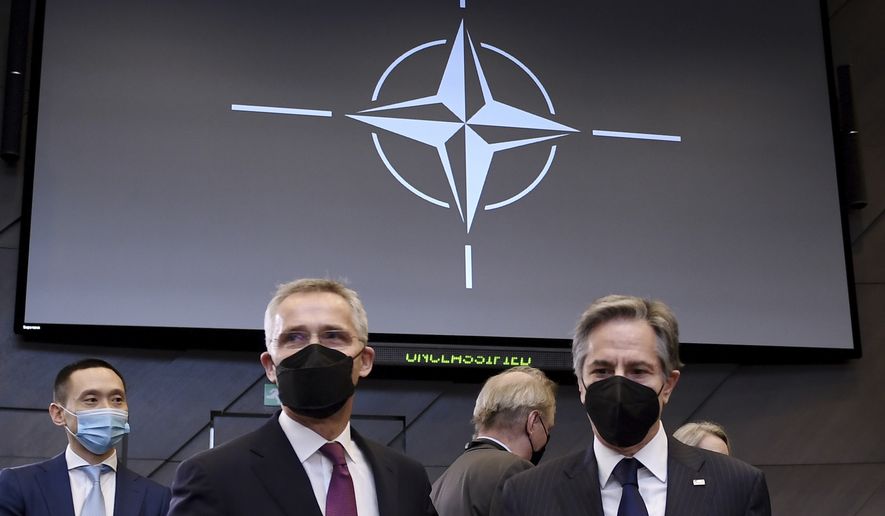Pentagon leaders say Russian President Vladimir Putin’s decision to invade Ukraine has accomplished a task that many believed couldn’t be done since the Soviet Union’s collapse: Draw the sometimes fractious NATO allies closer together in common purpose.
“NATO has come together with a strength that I haven’t seen for many, many years,” Gen. James C. McConville, Army chief of staff, said in remarks Tuesday. “You’ve seen a lot of countries change their whole philosophy [and] change their strategy in a matter of days.”
In a morning address at Fort Belvoir to an audience that appeared to be primarily retired Army colonels, defense contractors and a smattering of foreign military officers, the Army’s senior general made a not-so-subtle jab at the supply headaches that have bedeviled the Russian forces in the now two-week-old invasion of its smaller neighbor.
“Amateurs study tactics and professionals study logistics,” Gen. McConville said, repeating the famous military aphorism. “We’re seeing that play out right before our eyes.”
He noted the now-famous Russian supply convoy, reported to be 40 miles long, that has been parked for more than a week north of Ukraine’s capital of Kyiv, frustrating what appeared to be the Kremlin’s hopes of a lightning military victory.
“If you don’t have logistics, you don’t have gas, you don’t have parts, you don’t have ammunition and those weapons systems just become paperweights,” Gen. McConville said. “They just sit on the side of the road and can’t fight.”
By contrast, Gen. McConville recalled how he flew to Fort Stewart, Georgia, last month after about 3,800 troops from the 3rd Infantry Division were told they were shipping out to Europe to help reassure nervous NATO allies following Russia’s invasion of Ukraine.
Although the division’s 1st Armored Brigade Combat Team was given a week to ship out, it turned out they didn’t need that much time.
“I was going to go down there and see them over the weekend but they deployed before I could even get there,” he said Tuesday during an address to the Association of the U.S. Army.
The brigade arrived in Germany and quickly drew its allotment of tanks and other combat vehicles from pre-positioned stocks.
“In seven days, they were on the range shooting,” Gen. McConville said. “It was absolutely amazing what they were able to do.”
While cutting off and capturing Kyiv is the ultimate goal of the Russian invaders, Pentagon officials say Moscow has made only sporadic progress so far, which has caused them to shift to a new tactic: ramping up artillery and missile bombardments on residential neighborhoods and civilian targets. Russian forces have made more progress along Ukraine’s southern coast, again with a strategy that has featured bombing on non-military targets.
“We can’t access with specificity how much of those strikes on civilian infrastructure and residences are deliberate and how much of them are simply the result of imprecision,” a senior Defense Department officials told reporters at the Pentagon, calling it “all the more evidence of the reckless nature with which the Russians are propagating this invasion.”
• Mike Glenn can be reached at mglenn@washingtontimes.com.




Please read our comment policy before commenting.